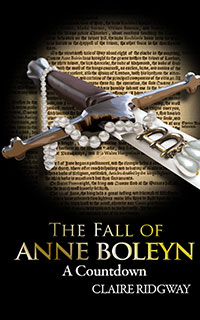On Tuesday 9th May 1536, King Henry VIII summoned Thomas Cromwell to meet with him regarding “such great and weighty matters as whereupon doth consist the surety of our person, the preservation of our honour, and the tranquillity and quietness of you and all other our loving and faithful subjects”. He also summoned a group of noblemen and gentleman to a Council meeting at Hampton Court Palace.
The 9th May was also the day that the justices of the King’s Bench at Westminster ordered the sheriffs of London assemble a grand jury the following day to rule on the offences alleged to have taken place at Whitehall and Hampton Court Palace.
As you can see, King Henry VIII was ‘in the thick of things’ and was the man in charge.

I wonder at what point during her imprisonment did Anne realise what was going to happen to her. Did she expect to be released or bannished to a convent.
Hi Joan,
I think that Anne knew Henry well enough to know that there was no escape for her, although it seems that she was offered the false hope of going into a nunnery by Archbishop Cranmer when he visited her on the 16th May.
Joan, I think once Anne went to the Tower and saw all the men who had been arested,she pretty much new she would not ever leave the Tower alive,Henry was on a mission, get rid of her Cromwell. Just my thouhts.
As a beginning researcher in the life of Anne Boleyn, I don’t believe I’ve read about what Anne did to pass those long hours during the day. What I’ve read mostly describes certain extreme moments and outstanding incidents. I can’t phantom what she did to keep her sanity.
Yes, I don’t know how she kept her sanity in the Tower, being surrounded by women who were acting as spies and knowing that she was waiting for death. I should think she spent her time reading and praying.
Joan, I agree with the Baroness with the exception of one point. The execution of a Queen was uncharted territory. It was a far cry from a coup or death of royalty during war. This was the “legal” (I say that with much sarcasm) removal and execution of a Queen.
Henry may have been merciless and selfish all of his life but surely it seems after the jousting accident that left him unconscious for two hours his cruelty and selfishness increased until his death. From fact and fiction I think a lot of us see that Henry made “legal” what he wanted the law to allow. He was King after all and who ever dared say no to the King of England?! It is very sad that through bad council and cruelty he was allowed to discard and execute his Queens at will “legally”.
I’m just not sure that he did get that much worse. Sir Thomas More, a friend and real father figure, was executed before the accident, as were the Carthusian monks. I believe that Henry was brutal when it came to people challenging his authority.